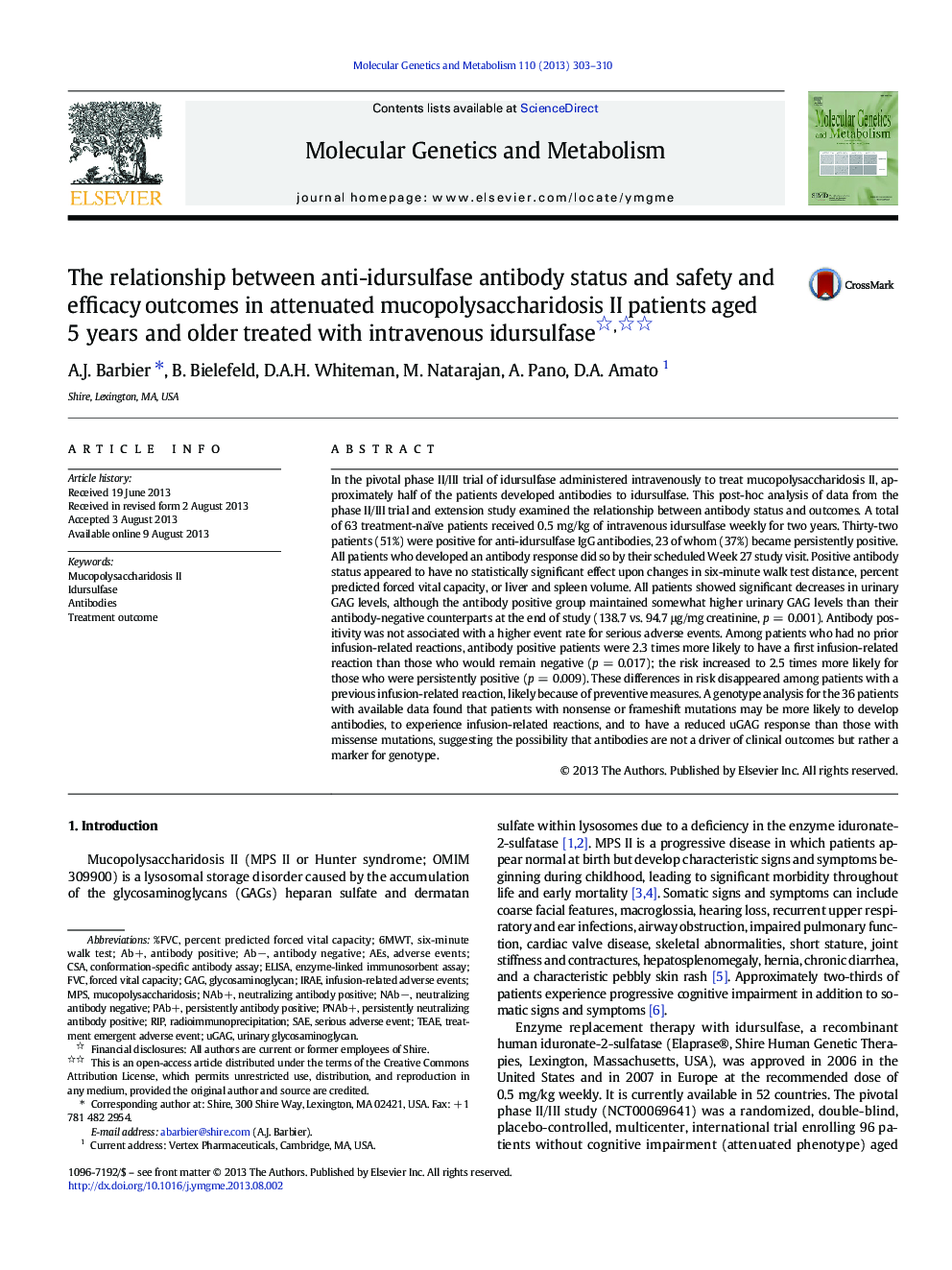| کد مقاله | کد نشریه | سال انتشار | مقاله انگلیسی | نسخه تمام متن |
|---|---|---|---|---|
| 10833204 | 1065789 | 2013 | 8 صفحه PDF | دانلود رایگان |
عنوان انگلیسی مقاله ISI
The relationship between anti-idursulfase antibody status and safety and efficacy outcomes in attenuated mucopolysaccharidosis II patients aged 5Â years and older treated with intravenous idursulfase
ترجمه فارسی عنوان
ارتباط بین وضعیت آنتی بادی ضد ایدروسولفاس و نتایج ایمنی و کارآیی در بیماران مبتلا به موکوپلیساکاریدوز ضعیف شده در بیماران 5 ساله و 5 ساله که داروی ایدزوفالس وریدی
دانلود مقاله + سفارش ترجمه
دانلود مقاله ISI انگلیسی
رایگان برای ایرانیان
کلمات کلیدی
IdursulfaseradioimmunoprecipitationMucopolysaccharidosis IIuGAGIRAEUrinary glycosaminoglycanFVCSAEGAG%FVC6MWT - 6 مگاواتAes - AESTEAE - teaerSix-minute walk test - آزمون پیاده روی شش دقیقه ایantibodies - آنتی بادی هاCSA - ایالات مؤتلفهٔ آمریکاELISA - تست الیزاEnzyme-linked immunosorbent assay - تست الیزاtreatment emergent adverse event - درمان عوارض جانبی ناگهانیforced vital capacity - ظرفیت حیاتی اجباریAdverse events - عوارض جانبیSerious adverse event - عوارض جانبی جدیMucopolysaccharidosis - موکوپلیساکاریدوزTreatment outcome - نتیجه درمانMPs - نمایندگان مجلسRIP - پاره کردنGlycosaminoglycan - گلیکوزآمینوگلیکان
موضوعات مرتبط
علوم زیستی و بیوفناوری
بیوشیمی، ژنتیک و زیست شناسی مولکولی
زیست شیمی
چکیده انگلیسی
In the pivotal phase II/III trial of idursulfase administered intravenously to treat mucopolysaccharidosis II, approximately half of the patients developed antibodies to idursulfase. This post-hoc analysis of data from the phase II/III trial and extension study examined the relationship between antibody status and outcomes. A total of 63 treatment-naïve patients received 0.5 mg/kg of intravenous idursulfase weekly for two years. Thirty-two patients (51%) were positive for anti-idursulfase IgG antibodies, 23 of whom (37%) became persistently positive. All patients who developed an antibody response did so by their scheduled Week 27 study visit. Positive antibody status appeared to have no statistically significant effect upon changes in six-minute walk test distance, percent predicted forced vital capacity, or liver and spleen volume. All patients showed significant decreases in urinary GAG levels, although the antibody positive group maintained somewhat higher urinary GAG levels than their antibody-negative counterparts at the end of study (138.7 vs. 94.7 μg/mg creatinine, p = 0.001). Antibody positivity was not associated with a higher event rate for serious adverse events. Among patients who had no prior infusion-related reactions, antibody positive patients were 2.3 times more likely to have a first infusion-related reaction than those who would remain negative (p = 0.017); the risk increased to 2.5 times more likely for those who were persistently positive (p = 0.009). These differences in risk disappeared among patients with a previous infusion-related reaction, likely because of preventive measures. A genotype analysis for the 36 patients with available data found that patients with nonsense or frameshift mutations may be more likely to develop antibodies, to experience infusion-related reactions, and to have a reduced uGAG response than those with missense mutations, suggesting the possibility that antibodies are not a driver of clinical outcomes but rather a marker for genotype.
ناشر
Database: Elsevier - ScienceDirect (ساینس دایرکت)
Journal: Molecular Genetics and Metabolism - Volume 110, Issue 3, November 2013, Pages 303-310
Journal: Molecular Genetics and Metabolism - Volume 110, Issue 3, November 2013, Pages 303-310
نویسندگان
A.J. Barbier, B. Bielefeld, D.A.H. Whiteman, M. Natarajan, A. Pano, D.A. Amato,
